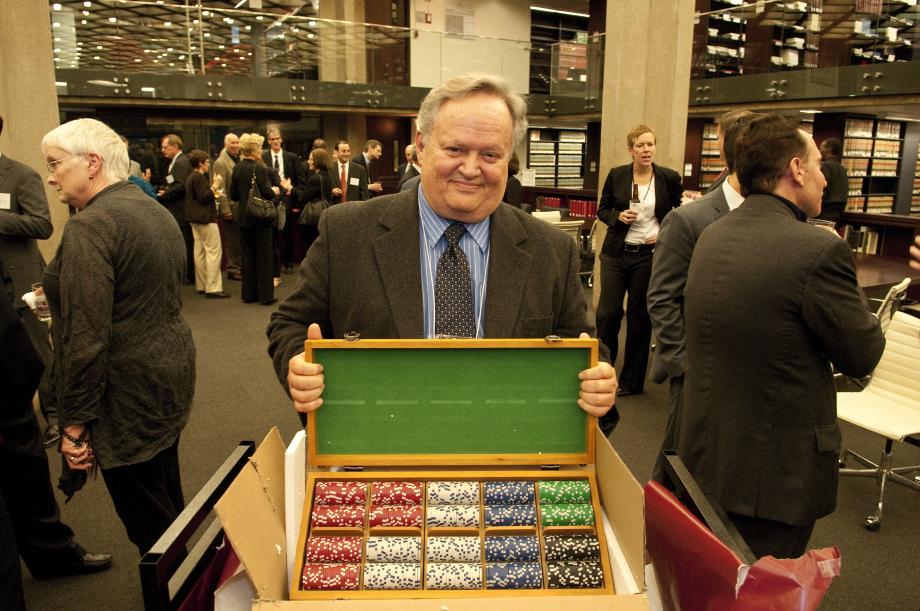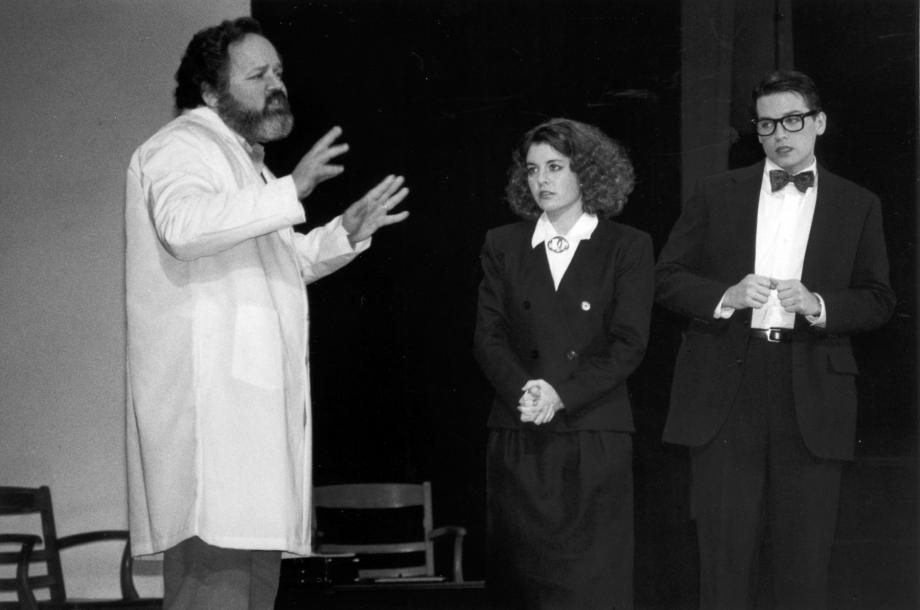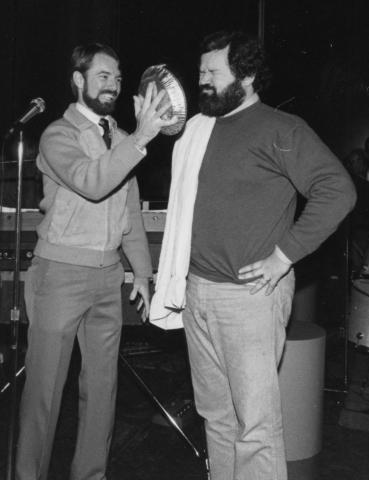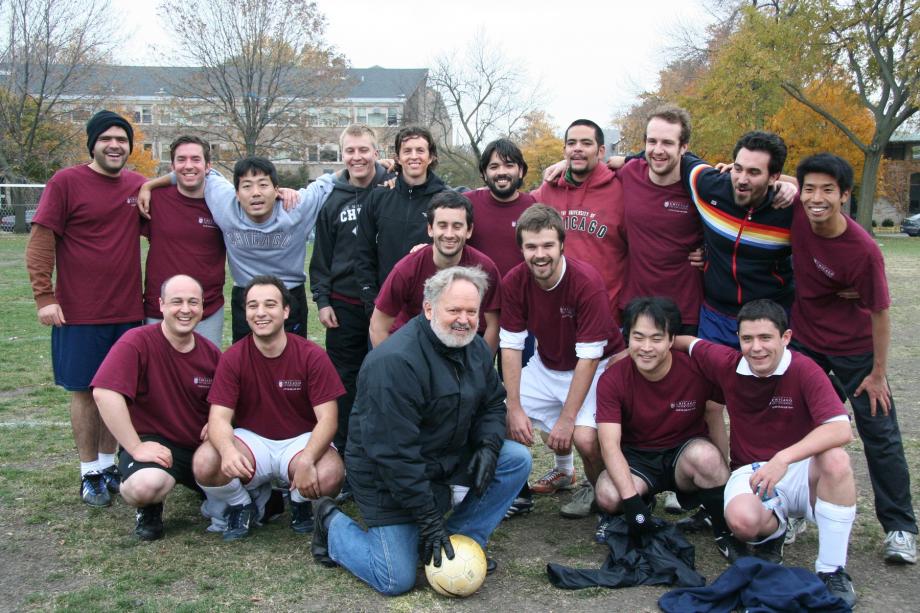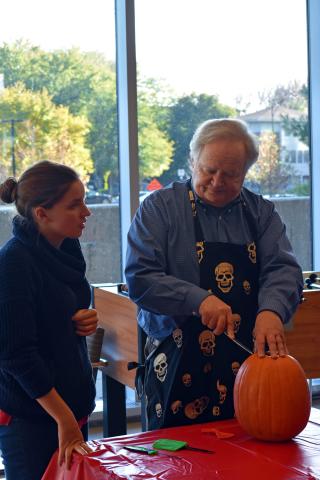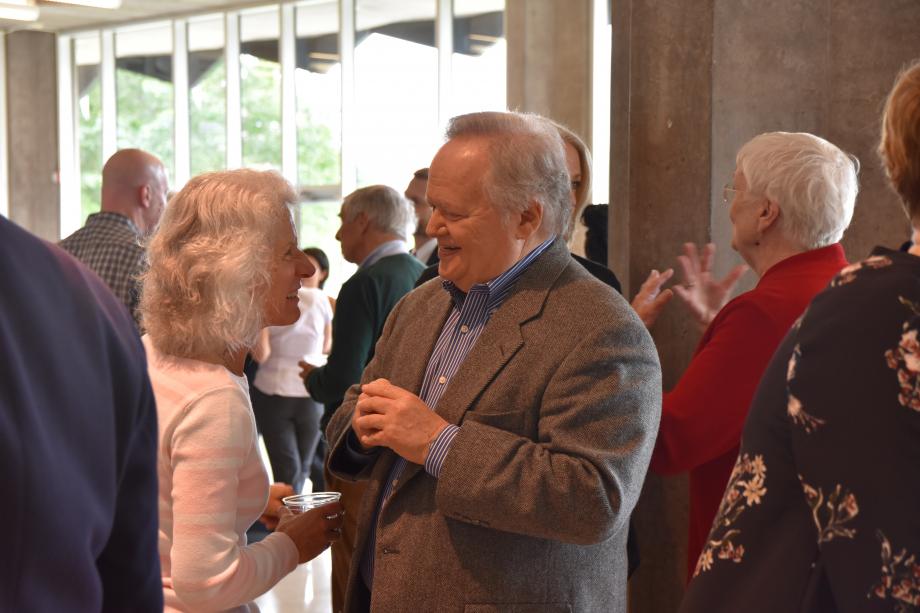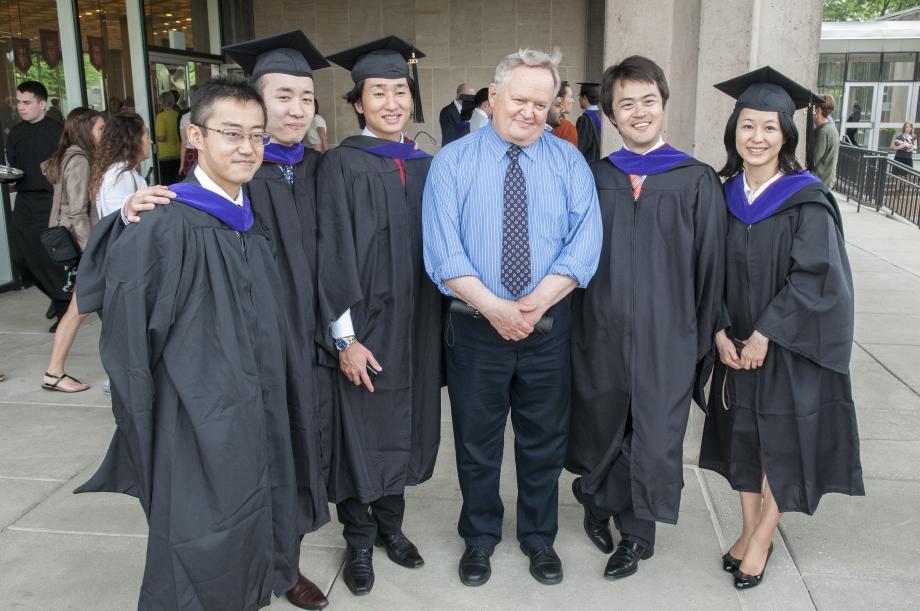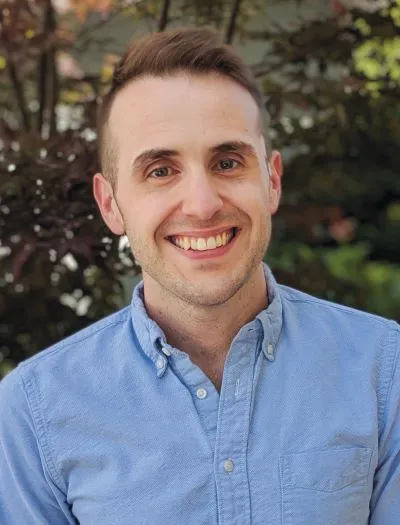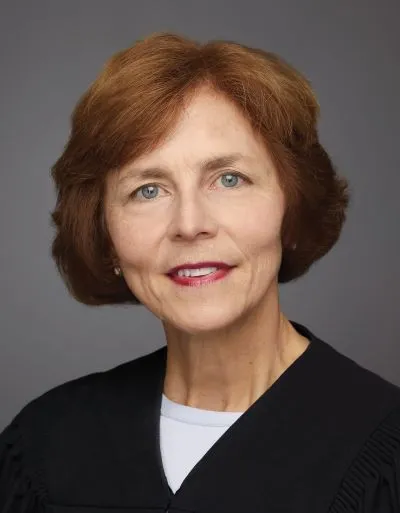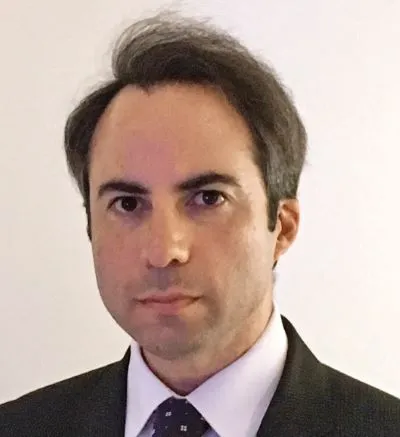An Enduring Commitment to the Law School and its Students
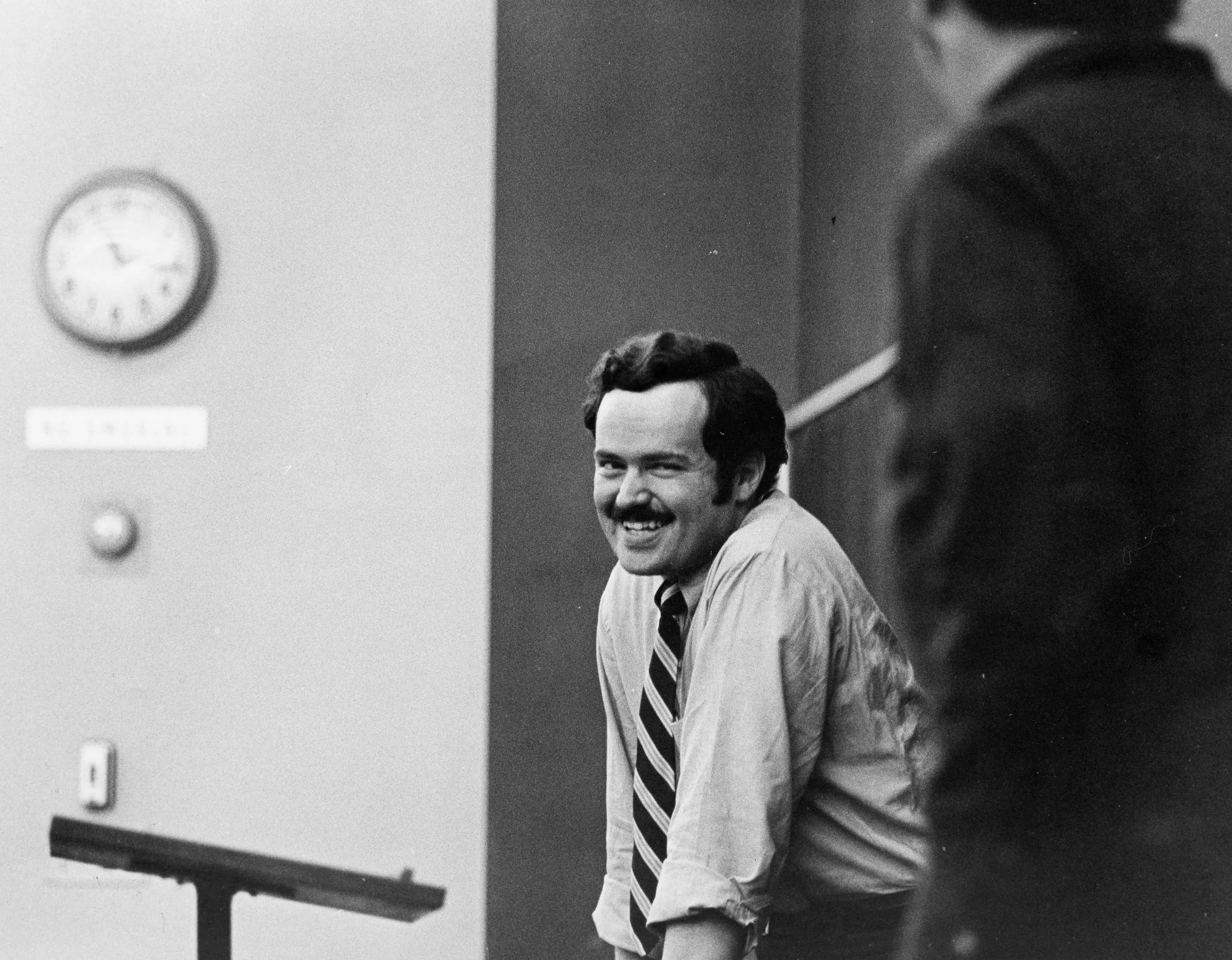
Every Thanksgiving for nearly 50 years, Richard Badger, ’68, has invited all of the Law School’s LLM students to his Hyde Park home for dinner.
When he started doing this—back in 1971, not long after he joined the Law School as the director of placement (now known as career services)—the LLM program consisted of just a dozen or so students, all of them international. The meal was homemade in those days: Badger and his family cooked and hosted the dinner, almost always with the help of former D’Angelo Law Library Director Judith Wright and her family. Badger even borrowed chairs from the Law School and carried them up three flights of stairs so that everyone would have a seat.
“I knew that most of the LLMs couldn’t go back to their homes for Thanksgiving break,” said Badger, who retired last August after a 48-year career in which he led Law School admissions, student services, career services, and graduate programs—sometimes all at the same time. “But I felt that we should have Thanksgiving for them, and so Judith Wright and I put that on with our families. And in fact, my kids grew up thinking that’s what Thanksgiving was.”
In 1999, the LLM, or master of laws, program became Badger’s primary responsibility in his role as associate dean for graduate programs, the title he held upon retiring. And as the LLM program—which offers international students a rigorous yearlong training in American law—grew under his leadership, so did the dinner. One turkey became two, and a year after Wright’s 2013 retirement, when there were roughly 80 LLMs, Badger decided to hire a caterer. Crucial features remained, though. The dinner always took place at Badger’s house—he never wanted it to be just another meal at the Law School—and began with a presentation on the history of the holiday. Moreover, it always offered international students a sense of home and camaraderie in a foreign country.
The tradition is one of many started by Badger that illustrates his approach to working with students—his knack for developing creative solutions, his emphasis on building community, and his resolve to be available to students and responsive to their needs.
“Dick’s contributions to student life and the administration of the Law School have been invaluable and too numerous to count,” said Dean Thomas J. Miles, the Clifton R. Musser Professor of Law and Economics. “It is no surprise that after almost 50 years serving our students with such dedication and expertise that Dick is so beloved and remembered so fondly by alumni. It will be hard to imagine the Law School without him, and we will all miss him tremendously.”
Over the last half century, Badger—who added dean of students and admissions to his responsibilities in 1972—has admitted thousands of students to the Law School. By 2012, he had admitted nearly half of all living alumni.
“Dick has been an ambassador and a fixture of the Law School for 48 years,” said Associate Dean for Admissions Ann K. Perry. “He has held almost every position [in student services] during his time here and has represented us through all of those roles—whether with prospective students (both US and international), current students, or alumni.”
Under Badger’s leadership, the number and variety of student organizations and programs grew, and his innovations regarding applications and recruiting became crucial to Law School admissions. His impact is also visible in less tangible ways: alumni often tell stories about Badger, citing his warmth, humor, and honest communication among the reasons they chose the University of Chicago Law School.
“In recent years, I often wound up sitting with LLMs at the Graduating Students Dinner, and I could tell from talking with them that Dick has done a truly terrific job, not only in recruiting and selecting students, but also in ensuring that they have a positive experience at the Law School,” said Geoffrey R. Stone, the Edward H. Levi Distinguished Service Professor, who worked closely with Badger as the Law School’s dean between 1987 and 1993. “I have no doubt that Dick’s engagement with our LLM students made a real difference in their education and in their lives at Chicago.”
An Unforeseen Path to Student Services
Badger was born in Battle Creek, Michigan, though he moved often throughout his childhood as the son of a traveling salesman. He began his undergraduate studies at the University of Vermont planning to focus on chemistry, but ultimately majored in political science. After a particularly interesting constitutional law course, Badger said, he decided to go to law school, and chose the University of Chicago primarily because it offered him a full-tuition scholarship. On the first day of class, he was Professor Grant Gilmore’s first cold call—a nerve-wracking moment that ultimately made him a better student.
“One of the great aspects of this law school is the cold calling, because it really forces you to prepare for class,” Badger said. “Like any other thing, whether it’s a meeting or something else, if you prepare for it, you’re going to get much more out of it, and it’s going to be a more rewarding experience.”
Badger graduated in 1968, and after serving in the military for two years and working briefly at a law firm, he returned to the Law School as the sole member of what is now the Office of Career Services. When the Law School’s dean of students left about a year later, Badger took on that role as well. In those years, the dean of students also handled admissions and financial aid, so until career services became a separate department in 1976, Badger handled all three areas himself, doing work that—in today’s larger and more operationally complex law school—is handled by roughly 26 staff members. (After career services became its own department, Badger continued as the dean of students and admissions for 20 years. In 1996, those offices split, and Badger remained responsible for JD admissions until taking over LLM and JSD admissions and administration in 1999.)
“Dick was highly regarded by students,” Stone said. “He was a delight to work with and was very caring about the institution. He was clearly someone who had a lot of integrity and who related to students in a very positive way.”
Shaping Admissions and Student Life
Leading both admissions and career services put Badger in a unique position to understand the student experience from start to finish. He learned quickly that an application file didn’t always offer the full story—there were certain skills and attributes that did not show up on paper. To get a better portrait of prospective students, Badger decided to make in-person interviews a part of the Law School’s application process. Now this is a standard practice, but in the 1970s, very few law schools did these types of interviews, Badger said.
“The question was, could an interview help you identify certain skills and personality traits associated with being a great classmate to fellow students and a professionally successful graduate?” Badger said. “The Admissions Committee would read the files in November and December, and in January and February I would travel around the country to interview the applicants that we could not reach a decision on based on the paper file.”
One of the many applicants Badger would interview and admit was James Comey, ’85, former United States deputy attorney general and, later, director of the Federal Bureau of Investigation. Comey had been waitlisted, but the University of Chicago remained his first choice. During a visit to the city, he stopped by the Law School with his girlfriend. When they arrived, his girlfriend—now his wife—insisted that he drop in and try to meet with Badger. Though he was hesitant, Comey ultimately relented, walked in, and waited patiently until Badger was available.
“[Our conversation] made me even hungrier to be admitted off the waiting list,” Comey said. “I had wanted to come from the start, but [the Law School] took a peek at my scores and grades and didn’t end up as enthusiastic about me as I was about it. So I was waitlisted. After my conversation with Dean Badger, I was admitted. Maybe that would have happened anyway, but I doubt it. He never acknowledged that he changed my life, but he did, as with so many others.”
Throughout his tenure in student services, Badger identified areas needing improvement and devised creative solutions. Early in his time as head of admissions, he realized that the recruiting model most law schools used—visiting colleges and inviting applicants to sign up for meetings—was primarily reaching those already interested in the school. Hoping to gain a much larger audience, Badger convinced several peer schools to band together for joint recruiting.
“We would travel around together to different colleges and do a late afternoon or evening presentation,” Badger said. “We would each talk about some element of the admissions process and then spend a couple of minutes talking about our own schools, and we drew many more people that way.”
Badger has been recognized as a leader not just within the Law School’s administration, but nationally. He has served as the president of the National Association for Law Placement, as a member of the board of trustees of the Law School Admission Council, and on the board of directors of the Law School Admission Services Corporation.
Despite the breadth and depth of his responsibilities, Badger found time to encourage students to bond and have fun outside of the classroom. He organized soccer matches between UChicago and Northwestern law students, launched—and identified funding for—the first Law School Musical, and allowed the highest student bidder to throw a pie in his face at the annual “Over the Hump” Party. For over 30 years he was the “commissioner” of the Law School’s Kalven League—an annual fantasy baseball competition named after Professor Harry Kalven Jr., ’38.
“One idea I had, which I never did for obvious reasons, was one day a week to handcuff the whole first-year class together so that they would go off and do something,” Badger said, laughing. “That way they wouldn’t worry about who was back in the library studying. They’d all be out there doing something together.”
Leading and Expanding the LLM Program
After roughly three decades working with JD students—a time in which class sizes grew and the roles and duties of administrators changed—Badger took over the Law School’s LLM and JSD programs. As associate dean for graduate programs, he streamlined the application process, making it as user-friendly and transparent as possible for the hundreds of international students who applied to either the one-year master of laws program or the multiyear doctoral program. Each year, he involved current LLM students in the preparation of housing and student life information he sent to admitted applicants.
Ruoying Chen, ’05 LLM, ’10 JSD, began at the University of Chicago as an LLM student before moving on the doctoral program. Early on at the Law School, Chen said, she got a sense of the care and purpose that Badger and the Graduate Admissions Committee put into selecting each year’s class.
“The LLM program in Chicago is one of the smallest ones among all top law schools in the US,” said Chen, who is currently an associate professor at Peking University Law School in China. “Therefore, the margin for errors and mismatch is much thinner than with a 500-student LLM program. I am completely persuaded that Dean Badger cared about it and always worked hard to ensure [that the LLM class fit] the rest of the Law School community. He insisted on picking candidates who could function as full citizens of the Law School—who not only benefited from the program but could also contribute to it.”
The LLM program’s smaller size already made it easier for students to become a close-knit group, but Badger nonetheless worked hard to foster a sense of community. He initiated the “national dinners” in which LLMs from each country would organize an activity and traditional meal for all of their classmates. He also started traditions that would offer them exposure to American culture throughout the yearlong degree. In addition to the Thanksgiving dinners and annual Super Bowl parties at a faculty member’s home, he organized Halloween pumpkin carving in the Green Lounge and created the international fellows program, which connects JD students and LLMs through a variety of attractions and events throughout Chicago. Badger’s well-known love of baseball meant there was an annual class trip to a Chicago White Sox game.
“The faculty would teach them the academic material they wanted to know by being in the United States, but part of our job was also to give them exposure to American culture,” Badger said. “Early on, before I had the LLM program, I actually took the LLM students to baseball games because I thought that was part of their experience. There was the general sense that it’s more than just an academic experience for them.”
Prioritizing Students and Their Needs
Whether he was working with JDs or LLMs, applicants or current students, Badger made a point of listening to his audience. Recognizing the academic pressure that students were often under, he reorganized the exam schedule to give them no more than one exam each day. Taking in and understanding their perspectives, Badger said, made it possible for him to shape the student experience to their benefit.
“He remained open-minded to new information, suggestions, and feedback from LLM students and alumni like me,” Chen said. “Every time I visited the Law School, which I did a lot, he always asked me some questions about law schools, law firms, and law students in China, and sought comments and suggestions on enhancing the programs.”
During a farewell celebration last June for Badger and other retiring senior staff members, Miles mentioned the extent to which alumni flock to and surround Badger during Reunion Weekend and other events. It is an indication, perhaps, of the value that Badger’s presence—his kindness, his accessibility, his wit—added to their years at the Law School.
“He was loved by my classmates for the same reason I loved him,” Comey said. “His warmth and humor were essential, especially in a place that, from time to time, was not chock-full of those attributes.”
Looking back on his time at the Law School, Badger attributes his 48 years at the institution in part to his childhood. Having moved around so often when he was a kid, once he found the right fit in Chicago, he knew he wanted to stay. Badger has also appreciated the chance to polish and perfect various student services over the years, and he has enjoyed the direct contact with students, from application to graduation and everything in between.
“The students here are fabulous,” Badger said. “They’re smart, they’re generally very ambitious people, and again, if you listen to them and try to understand their perspective, they’re great people to work with.”
In his retirement, Badger is looking forward to reading through the New Yorker magazines that have piled up over the years and spending more time traveling to visit family. Though he won’t miss reviewing and worrying about applications, he said, he will miss the community in all its forms—the students, the faculty, other administrators, and his colleagues in admissions at law schools across the country.
Badger looks forward to seeing graduates at Reunion Weekend for years to come. And despite having retired, he plans to have the new class of LLMs over for Thanksgiving this November.
